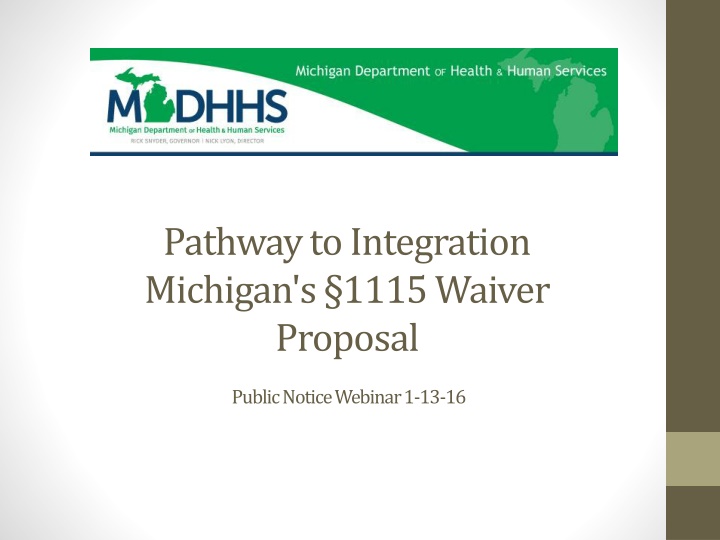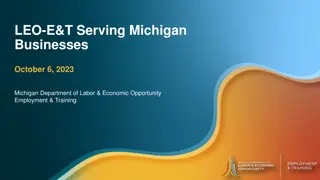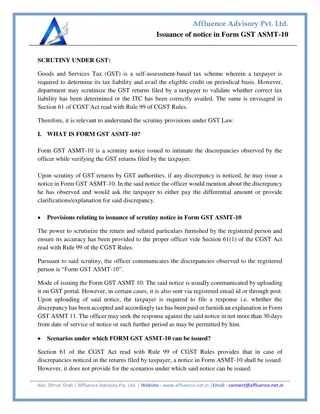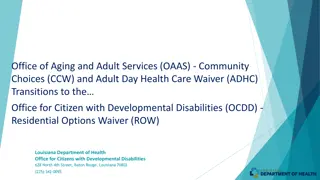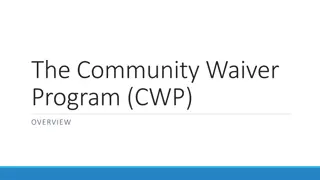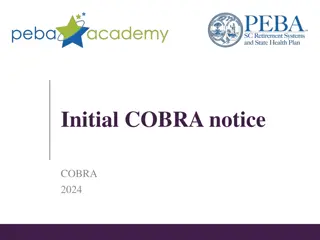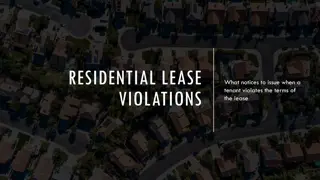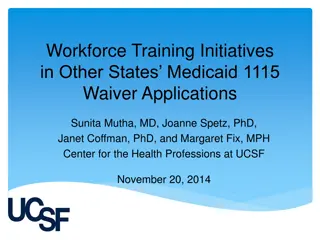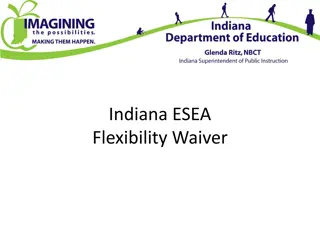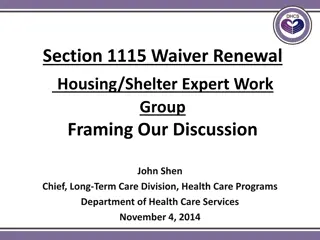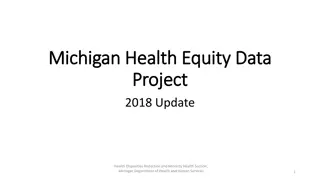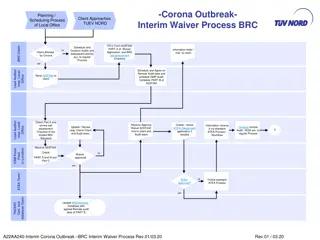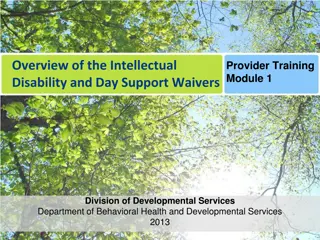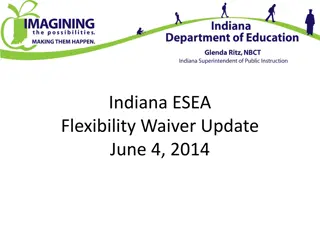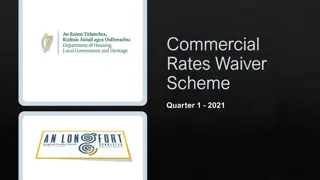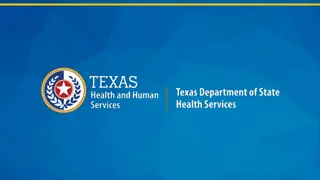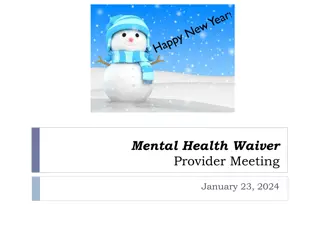Michigan's 1115 Waiver Proposal Public Notice Webinar Overview
Michigan is holding webinars to present its 1115 waiver proposal for behavioral health, substance use disorders, and developmental disabilities. The webinars aim to inform the public, outline the proposal's sections, and gather meaningful input.
Download Presentation

Please find below an Image/Link to download the presentation.
The content on the website is provided AS IS for your information and personal use only. It may not be sold, licensed, or shared on other websites without obtaining consent from the author.If you encounter any issues during the download, it is possible that the publisher has removed the file from their server.
You are allowed to download the files provided on this website for personal or commercial use, subject to the condition that they are used lawfully. All files are the property of their respective owners.
The content on the website is provided AS IS for your information and personal use only. It may not be sold, licensed, or shared on other websites without obtaining consent from the author.
E N D
Presentation Transcript
Pathway to Integration Michigan's 1115 Waiver Proposal Public Notice Webinar 1-13-16
Goals of Todays Webinar To provide an overview of the webinar process and where related material can be found. 1/13/2016 Outline the background information related to Michigan's decision to pursue a 1115 waiver for persons with behavioral health, substance use disorders and intellectual and/or developmental disabilities. To provide a sufficient level of detail by waiver proposal section to ensure meaningful input from the public. 2
Webinar Overview This webinar is the first of two public hearings to be held on Michigan's Pathway to Integration 1115 waiver proposal. The second hearing will be on 1-28-16 at the Lansing Center, from 10- 11:30am at 333 Michigan Avenue, Lansing Michigan. 1/13/2016 The webinar today will be muted by the host. Session participants will be able to type in questions on Adobe Connect. During three intervals, the host will respond to posted questions. While not all questions will be responded to today, all questions and answers will be posted on the MDHHS website after the comment period has ended. Hard copies of the comments, questions and answers will be made available upon request at the email or address provided on page 4 of this slide deck. The slide deck will also be available on the same site shortly after today s webinar. 3
Webinar Overview A copy of the complete 1115 waiver, stakeholder notice and waiver summary is available online at www.michigan.gov/mdhhs >> Keeping Michigan Healthy >> Behavioral Health & Developmental Disability >> Mental Health. 1/13/2016 You may request a hard copy of the complete 1115 waiver, stakeholder notice and waiver summary by contacting Teri Baker at the address below. You may also submit questions or comments regarding the waiver to the address below or by email at MDHHS-Pathway1115@Michigan.gov. All comments on this topic should include a "Section 1115 Pathway to Integration" reference somewhere in the written submission or the subject line if by email. Michigan Department of Health and Human Services Behavioral Health and Developmental Disabilities Administration Bureau of Community Health 320 S. Walnut Street, Lewis Cass Building, 5th Floor Lansing, MI 48913 4
Pathway to Integration Background Over the past the past 18 years, Michigan has operated under a Managed Specialty Service & Supports Waiver (MSS&SW) through a 1915(b) Managed Care Waiver. 1/13/2016 The MSS&SW has been the vehicle used to waive Freedom of Choice requirements and to mandate managed care enrollment (basically creating the structure of Prepaid Inpatient Health Plans). Connected to the MSS&SW are the 1915(b(4) Children's waiver Program (CWP), the 1915(b(4) waiver for Children with Severe Emotional Disturbances (SEDW) (both Fee for Service (FFS) programs) and the 1915(c) Habilitation Supports Waiver (HSW) and all applicable State Plan services. 5
The Desire and Need for Change With each 1915(b) waiver renewal and/or amendments over the past several years, Michigan has struggled to meet the cost effectiveness requirements of its 1915(b) waiver services. 1/13/2016 Cost effectiveness for the purposes of this proposal means the rate of increases in the costs of the 1915(b) waiver services cannot exceed the rate of increase in of other state plan services over the term of the waiver. Because Michigan provides one of the most robust set of community based supports in the country, the requirements for the 1915(b) waiver to be considered cost effective without limiting or moving benefit options has became difficult, if not impossible. Additionally, and building off of multiple statewide integrated physical and behavioral health care initiatives, Michigan desires to test integrated care initiatives specifically targeting the populations covered by this waiver proposal. 6
Questions so far? 1/13/2016 7
Pathway to Integration Waiver Proposal Michigan has a long standing commitment to community supports and inclusion for persons with Severe Mental Illness (SMI), Substance Use Disorders (SUD), Intellectual and/or Developmental Disabilities (I/DD), and Children with Severe Emotional Disturbances (SED). 1/13/2016 The Pathway to Integration Waiver is intended to combine under a single waiver authority all services and eligible populations served through its current 1915(b), State Plan and its multiple 1915(c) waivers (aka. Specialty Service System/Populations). 8
Waiver Rationale The 1115 waiver allows broad flexibility to combine existing waivers with differing eligibility and service arrays. 1/13/2016 The 1115 waiver is one of the only waiver models that did NOT require reducing current Medicaid eligible populations without adding additional waivers. The 1115 waiver allows the state to develop quality financing and integrated care initiatives specifically for the Specialty Service Populations. The 1115 waiver enhances the prospect of streamlining multiple payment and reporting requirements as we bring new populations into managed care arrangements. 9 The 1115 waiver allows options for integrated service and delivery options for person with SUD.
Hypotheses/Goal of Demonstration The goal of this Demonstration is to create a robust evaluation that tests both quality and cost outcomes between traditional Medicaid Health Plans (MHPs) and Michigan s Specialty Service System. 1/13/2016 Proposed Key indicators include: Joint identification and tracking of High Utilizers. Access to care incentives. Pilot Demonstrations through the State Innovation Model (SIM) and Accountable Systems of Care (ASC). Enhancement of co-occurring (SMI/SUD) services. The use of Specialized Complex Care Managers for individuals considered High Utilizers. 10
Medicaid Eligibility There are no eligibility changes proposed under this waiver that do not currently exist. These also Include eligible MI CHILD and Healthy Michigan Plan beneficiaries. Michigan intends to maintain the current service array and, where possible and explore the expansion of enrollment caps for certain services previously provided through its 1915(c) CWP and SEDW programs (as legislatively approved). 1/13/2016 All current HSW enrollees and services (including HSW enhanced payments) will be covered under this 1115 waiver authority. Anticipated beneficiaries served under this waiver and current enrolment caps are outlined below: 1915(c) HSW = 8268 1915(c) SEDW = 969 1915(c) CWP = 469 Estimated Demonstration populations Including 1915(b)/(c) Populations = 230,000 11
Demonstration Benefits The services covered under this 1115 waiver include the full array of mandatory and optional State Plan services for persons who meet the eligibility and the needs assessment criteria for the Specialty Services System (see pages 9-17 of the waiver proposal). 1/13/2016 This includes individuals with Autism Spectrum Disorder, individuals eligible for Michigan s Special Health Insurance Program (aka MI CHILD) and expanded Medicaid Populations. Michigan is NOT reducing or limiting any benefits previously offered. Michigan will also be providing integrated SUD delivery systems and services and adding coverage for the inclusion of Permanent Supportive Housing for all eligible populations. 12
Questions so far? 1/13/2016 13
Delivery Systems and Reforms Enrollment into the Michigan s Specialty Service System will continue to be mandatory based on the criteria described in Section II of the waiver proposal. 1/13/2016 Michigan will continue to use a single Specialty Service System (on a statewide basis) for State Plan and the former 1915(b) and 1915(c) waiver beneficiaries who meet Specialty Service Criteria. This includes persons previously enrolled in the MI CHILD program and expansion populations. The former CWP and SEDW programs will move from FFS delivery system to managed care. The alignment of quality and financial incentives between Medicaid Health Plans and Michigan s Specialty Service System. 14
Delivery Systems and Reforms (cont.) The proposed delivery system changes will require PIHPs and their CMHSP providers to meet quality reporting requirements, develop enhanced SUD provider systems and provide or partner with Medicaid Health plans to improve access for persons with mild and moderate behavioral health disorders. 1/13/2016 These linkages are intended to: Identify and provide education, prevention and treatment of modifiable health risk factors. Provide Screening Brief Intervention Referral and Treatment (SBIRT) services for persons with SUD. Provide housing first initiatives/models through permanent supportive housing models. Provide incentives for increased access to primary care and the coordinated tracking of High Utilizers of emergency department usage and hospital admissions/readmissions. 15
Long Term Service and Supports & Self Direction The Demonstration will provide personal care and Long Term Services and Supports (LTSS) including options for both self- direction/determination models, including the use of fiscal intermediaries. 1/13/2016 Waiver participants will have opportunities for both employer and budget authority. Participants may elect to control their individual budget for all services or can direct a single service for which participant direction is an option. The participant may direct the budget and directly contract with chosen providers. 16
Payments to Managed Care Entities Capitation rates will include all State Plan, 1915(b) and 1915(c) waivers as outlined in Exhibit 1 of the proposal. 1/13/2016 Capitation rate values will be developed using PIHP submitted encounter data and Medicaid Utilization Net Cost Reports (MUNC) and will vary by benefit type and program code. Rate adjustment factors will be developed to reflect age, gender and geographic region for each benefit category. As with the current 1915(b) and 1915(c) waivers, PIHPs are responsible for all Medicaid beneficiaries within a geographic catchment area who meet criteria for the Specialty Service System. Questions regarding budget neutrality estimates outside of those outlined in Appendix C, will be answered and posted on the MDHHS website after the comment period has closed. 17
Quality Based Supplemental Payments MDHHS intends to hold back up to 1.0% of capitation payments to be redistributed based on meeting the Demonstration expectations and/or other shared metrics. 1/13/2016 Current Quality based incentives include: The implementation of complex care management. joint PIHP and MHP performances incentives. Incentives to PIHP regions who service foster children and children in Child Protective Services (CPS) with Serious Emotional Disturbances. 18
Implementation of the Demonstration Phase 1 (Upon submission and anticipated approval): The consolidation of the existing 1915(b) and 1915(c) Waivers. The development of the demonstration evaluation and collection of baseline data. The statewide evaluation and system readiness for a reformed SUD delivery system. Based on system readiness may be phased approach and include Demonstration years 2 and 3. 1/13/2016 Phase 2 (may span Demonstration years 2 and 3): The development of bundled funding and other quality incentives for Accountable Systems of Care. Medicaid Health Plans and PIHP will be contractually required to monitor certain quality and integrated care outcomes that lead toward the tracking and implementation of potential shared savings models. 19
List of Proposed Waiver & Expenditure Authorities Proper and Efficient Administration 1902(a)(4) Rationale for Authority: Mandate beneficiaries into a single Prepaid Inpatient Health Plan 1/13/2016 Comparability 1902(a)(17) This waiver program includes benefits specific to eligibility criteria as described in Section II that will not be available to other Medicaid beneficiaries. Amount, Duration, and Scope 1902(a)(10)(B) To enable the State to offer a different benefit package to the Demonstration participants that varies in amount, duration, and scope from the benefits offered under the State Plan. 20
List of Proposed Waiver & Expenditure Authorities Freedom of Choice 1902(a)(23)(A) To enable the State to restrict Demonstration participants to receive benefits through PIHPs and CMHSPs. Rationale for Authority beneficiaries enrolled in the program must receive services through a PIHP. 1/13/2016 Choice of Coverage 1932(a)(3) To enable the State to assign Demonstration participants to PIHPs based on geography and to permit participant choice of provider, but not plan. Reasonable Promptness Section 1902(a)(8) To enable the State to limit enrollment for Demonstration eligible population in order to remain under the annual budget neutrality limits under the Demonstration. 21
List of Proposed Waiver & Expenditure Authorities Methods of Administration: Transportation 1902(a)(4), insofar as it incorporates 42 CFR 431.53 To enable the State to assure transportation to and from providers for the Demonstration participants. 1/13/2016 Eligibility Standards 1902(a)(17) To enable the State to apply different eligibility methodologies and standards to the Demonstration eligible population than are applied under the State Plan. Retroactive Eligibility Section 1902(a)(34) To enable the State to not provide coverage for the Demonstration eligible population for any time prior to the first day of the month in which the application was received by the State. 22
Appendix A LTSS As outlined in Section II, item 6, Michigan will be including LTSS that were previously provided through its 1915(b) and its multiple 1915(c) waivers. 1/13/2016 Appendix A outlines the MDHHS Quality Assessment and Performance Improvement Program (QAPIP) including the current risk management and critical incident reporting. Appendix A, also outlines MDHHS site review process and will include all 1115 waiver populations. 23
Appendix B LTSS Appendix B provides a service description and provides a grid of all LTSS service descriptions and provider qualifications. 1/13/2016 Appendix B services mimic those included in the current 1915(b)/(c) and multiple 1915(c) waivers included in this proposal. 24
Questions? 1/13/2016 25
